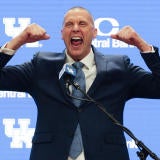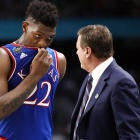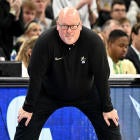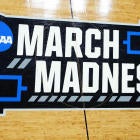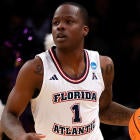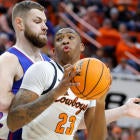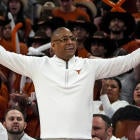The Kansas Jayhawks have a lot of positive momentum flowing their way as they enter the 2018-19 season.
They are No. 1 in both the AP and coaches preseason men's basketball poll, and are one of the top bets in Vegas to cut down the final nets next April. Once again, for the umpeenth consecutive season, they are the favorite to win the Big 12 Conference Championship. There's rarely a gloomy outlook in Lawrence, but this season is especially bright.
The sunshine forecast has stumbled into a bit of an overcast, stormy outlook recently, however. Though this season still absolutely figures to be KU's most promising in more than a decade based on returning experience and overall talent level, the federal government's interest in weeding out corruption at the core of college basketball, specifically inside recruiting circles, has tethered the Jayhawks into the fold. They're now one of a handful of programs under the government's microscope; the NCAA has taken an interest, too.
During testimony at the first of three trials in the corruption case, Silvio De Sousa, a sophomore student-athlete on KU's active roster, allegedly accepted money to commit to Maryland -- then money to Kansas -- leaving KU no choice but to announce this week it will withhold him from competition while an NCAA eligibility review is conducted.
"Information was presented during the current trial in New York -- some of which we knew, some of which we didn't," Bill Self said in a statement this week. "We have decided to withhold Silvio from competition until we can evaluate and understand the new information. We have already discussed trial developments with the NCAA and will continue to work with NCAA staff moving forward."
De Sousa was a bench player a year ago for the Kansas squad that made its way to the Final Four, and was again expected to be in a reserve role in his second season. Overall, his absence is likely replaceable long-term. Udoka Azubuike is the entrenched starter at the center spot, and De Sousa wasn't a threat to that. But without De Sousa providing quality relief minutes, Self will have to get creative in catching breathers for his 7-foot rim-rattling big man.
How Self attacks that angle of this issue is but one of a handful of major questions now facing the Jayhawks. Here are five other relevant questions the trial has forced Kansas to face ahead of the season.
1. Does Kansas have enough big men to deal?
Azubuike is the most notable returnee of KU's big men. In his sophomore season last year, his first fully healthy season, he averaged 13.0 points, 7.0 rebounds and 1.7 blocks per contest in a 23.6 minute-per-game workload. He was a great complement to KU's guard-heavy roster.
De Sousa's minutes may have ticked up a bit to relieve Azubuike, however with De Sousa out, Azubuike's minutes may get stretched farther than usual. According to KenPom.com, De Sousa was the No. 2 most used big in KU's center rotation over the final five games of 2018 in relief of Azubuike. So despite the more experienced presence of Mitch Lightfoot, the young freshman had earned premium rotation minutes by season's end. That's not an insignificant detail, and KU knows it must address.
Without De Sousa, KU's options are largely unproven. The obvious, perhaps most lethal replacement for De Sousa would be for KU to convert to a smaller lineup, with Memphis transfer Dedric Lawson flexing up to the five-spot. For example, if KU went with a starting bunch of Devon Dotson, Charlie Moore, Quentin Grimes and Lagerald Vick, it could unleash Lawson at the center position for a college version of Golden State's death lineup.
Kansas could also opt to go with a more traditional lineup, as Self has shown he prefers over the years. If he did, it would allow Lawson, KU's best player, to play at a more natural position.
Lightfoot has shown himself capable of playing quality spot minutes, averaging 14 minutes per game last season. But if David McCormack's the prospect people expect him to be, he could come into his own and command the majority of the No. 2 reps perhaps as early as conference play. With or without De Sousa, KU isn't short on talent or options.
2. Can KU try to squeeze in a new player for spring semester?
Last season, De Sousa joined Kansas at start of the second semester, giving the Jayhawks a much-needed frontcourt boost simply by reclassifying and slowly working his way into college shape. Are there other high school upperclassmen who might consider doing the same, with the opportunity to join the preseason No. 1?
The Jayhawks have a number of scholarship offers out to Class of 2019 big men -- among them Kofi Cockburn, Will Baker, Zeke Nnaji and younger brother of Dedric and K.J. Lawson, Chandler Lawson -- but it seems unlikely as we head into the season that KU will try to push for any commitments and subsequent reclassification on that front. Lawson makes some sense, if only because of the ties to KU, but he's seen more as a small forward in college than a power forward. Standing pat with the Azubuike-McCormack-Lightfoot trio at center is the likely path KU will opt to travel. Even without De Sousa, KU's lineup is deep with experience, talent and athleticism at every position. Lawson's roster flexibility gives Self innumerable options.
"I don't see it as being a huge negative," Self said this week in an appearance on WHB (810 AM) after being asked about how De Sousa's absence will impact his team's rotation. "I do see it as being a good player we don't have at our disposal Thursday (during a KU exhibition game) or however long it would be, based on the review."
3. Will De Sousa get cleared to play this season?
I'm not ruling anything out with respect to De Sousa's eligibility, or perhaps lack thereof, moving forward.
Kansas has decided it will withhold him from competition until the NCAA clears him in the matter. But a recap of what was alleged in federal court during the first college hoops trial over the last month makes it pretty difficult to see how the NCAA could determine his, ahem, interesting recruitment was above board.
Former Adidas consultant T.J. Gassnola testified that an unidentified Maryland booster paid De Sousa's guardian, Fenny Falmagne, $60,000 to attend Maryland.
Gassnola testified that he paid Falmagne $20,000 for De Sousa to attend Kansas to help repay the unidentified Maryland booster after De Sousa decided to go to KU instead of Maryland.
Gassnola testified that, while he never actually gave the previously promised $20,000 to Falmagne, he did give the individual $2,500 to pay for De Sousa's online classes.
There are many who believe De Sousa has likely played his last collegiate game in Lawrence. He very well could've already played his last collegiate game, period, if the testimony in court is found to be true during his eligibility review.
Bottom line is this: No one knows where the NCAA will come down on De Sousa's ruling. We're talking about a governing body that is wildly unpredictable with regard to its scope of investigations, as well as what's punishable and what's not. De Sousa could gain eligibility next week or never again, and neither ruling would particularly surprise anyone. I suspect, however, he won't play another minute in college.
4. Should De Sousa go pro and move on from Kansas?
De Sousa could opt to skip town, and there's precedent on him taking such an action. Last season, Billy Preston, who crashed his car on campus and was subsequently held from competition while KU looked into the "financial picture" of the vehicle, didn't play a minute for the Jayhawks.
Preston left KU before season's end, signing in Bosnia with a professional team before entering the 2018 draft. Preston did not sign until after the fall semester, so De Sousa could follow Preston's lead in that regard. Because the NCAA's investigation isn't likely to be treated expeditiously, he has the luxury to be patient with his decision and will likely still have some options down the road if he leaves Kansas.
Leaving may limit the pro options available to him in the future, though. By-and-large, De Sousa isn't ready to be a productive pro player -- at least not in the NBA. He could use as much college development as possible, especially since, had he not reclassified, he'd just be entering his freshman season in college this year. Waiting out the NCAA and hoping for a favorable ruling may take awhile, though. Is it worth the risk to him of waiting for a ruling, only to find out six months from now he's deemed permanently ineligible to play in college? Banking on a positive outcome with regards to his KU tenure doesn't seem promising, based off evidence that's come to light in court.
5. Without De Sousa, should KU still be considered No. 1?
You could make a case that Kentucky, or perhaps Gonzaga or Duke, should be considered as the No. 1 with De Sousa's absence leaving a notable void on the preseason No. 1's roster. But I wouldn't buy whatever your argument is.
Even with De Sousa out for the foreseeable future -- and perhaps longer -- KU's roster is simply far superior to the other preseason top teams for it to be considered anything other than tops entering the season.
Dedric Lawson is going to be a stat monster, Quentin Grimes is a one-and-done talent who will bring with him athleticism, production and versatility, and transfers Charlie Moore and K.J. Lawson are all expected to be big factors. I haven't even made mention of Azubuike or Vick. Oh, and they have a Hall of Fame coach orchestrating the whole thing.
Barring a significant injury, KU should be considered No. 1 until proven otherwise.







